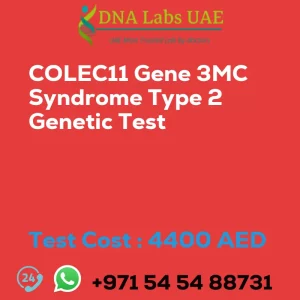CHST3 Gene Spondyloepiphyseal Dysplasia with Congenital Joint Dislocations Genetic Test
Are you concerned about Spondyloepiphyseal dysplasia with congenital joint dislocations (SEDCJD)? DNA Labs UAE offers a comprehensive genetic test for this rare genetic disorder. With a test cost of AED 4400.0, our CHST3 Gene Spondyloepiphyseal Dysplasia with Congenital Joint Dislocations Genetic Test can provide valuable insights into your condition.
Test Components and Price
- Test Name: CHST3 Gene Spondyloepiphyseal Dysplasia with Congenital Joint Dislocations Genetic Test
- Price: 4400.0 AED
Sample Condition and Report Delivery
We accept blood or extracted DNA samples for this test. Alternatively, you can provide one drop of blood on an FTA Card. The report will be delivered within 3 to 4 weeks.
Test Method and Type
- Method: NGS Technology
- Test Type: Osteology, Dermatology, Immunology Disorders
Doctor and Test Department
- Doctor: Dermatologist
- Test Department: Genetics
Pre Test Information
If you or a family member is going for the CHST3 Gene Spondyloepiphyseal Dysplasia with Congenital Joint Dislocations NGS Genetic DNA Test, it is important to provide the clinical history of the patient. Additionally, a genetic counseling session will be conducted to draw a pedigree chart of family members affected by the CHST3 Gene Spondyloepiphyseal Dysplasia with Congenital Joint Dislocations NGS Genetic DNA Test gene CHST3.
Test Details
Spondyloepiphyseal dysplasia with congenital joint dislocations (SEDCJD) is a rare genetic disorder characterized by skeletal abnormalities, particularly in the spine and joints. It is caused by mutations in the CHST3 gene. The CHST3 gene provides instructions for producing an enzyme called chondroitin-6-sulfotransferase, which is involved in the production of chondroitin sulfate, an important component of cartilage and connective tissues.
Due to mutations in the CHST3 gene, chondroitin-6-sulfotransferase activity is reduced or absent. This leads to abnormal development of cartilage and skeletal structures, resulting in the characteristic features of SEDCJD.
Our NGS (Next-Generation Sequencing) genetic testing technique allows for the simultaneous analysis of multiple genes associated with genetic disorders. It is a powerful tool for diagnosing rare genetic conditions like SEDCJD.
To perform the NGS genetic test for SEDCJD, we require a DNA sample. This can be obtained through a blood or saliva sample from the individual suspected of having the condition. The DNA is then sequenced using NGS technology to identify any mutations or variations in the CHST3 gene.
By identifying the specific mutation in the CHST3 gene, NGS genetic testing can confirm a diagnosis of SEDCJD. This information is crucial for genetic counseling, management, and treatment options.
It is important to note that genetic testing should be conducted by a qualified healthcare professional or genetic counselor who can interpret the results and provide appropriate guidance and support.
| Test Name | CHST3 Gene Spondyloepiphyseal dysplasia with congenital joint dislocations Genetic Test |
|---|---|
| Components | |
| Price | 4400.0 AED |
| Sample Condition | Blood or Extracted DNA or One drop Blood on FTA Card |
| Report Delivery | 3 to 4 Weeks |
| Method | NGS Technology |
| Test type | Osteology Dermatology Immunology Disorders |
| Doctor | Dermatologist |
| Test Department: | Genetics |
| Pre Test Information | Clinical History of Patient who is going for CHST3 Gene Spondyloepiphyseal dysplasia with congenital joint dislocations NGS Genetic DNA Test. A Genetic Counselling session to draw a pedigree chart of family members affected with CHST3 Gene Spondyloepiphyseal dysplasia with congenital joint dislocations NGS Genetic DNA Test gene CHST3 |
| Test Details |
Spondyloepiphyseal dysplasia with congenital joint dislocations (SEDCJD) is a rare genetic disorder characterized by skeletal abnormalities, particularly in the spine and joints. It is caused by mutations in the CHST3 gene. The CHST3 gene provides instructions for producing an enzyme called chondroitin-6-sulfotransferase. This enzyme is involved in the production of a molecule called chondroitin sulfate, which is an important component of cartilage and other connective tissues. Mutations in the CHST3 gene result in reduced or absent chondroitin-6-sulfotransferase activity. This leads to abnormal development of cartilage and skeletal structures, causing the characteristic features of SEDCJD. NGS (Next-Generation Sequencing) genetic testing is a technique used to identify mutations in genes associated with genetic disorders. It allows for the simultaneous analysis of multiple genes, making it a powerful tool for diagnosing rare genetic conditions like SEDCJD. NGS genetic testing for SEDCJD involves obtaining a DNA sample, usually through a blood or saliva sample, from the individual suspected of having the condition. The DNA is then sequenced using NGS technology to identify any mutations or variations in the CHST3 gene. By identifying the specific mutation in the CHST3 gene, NGS genetic testing can confirm a diagnosis of SEDCJD and provide valuable information for genetic counseling, management, and treatment options. It’s important to note that genetic testing should be performed by a qualified healthcare professional or genetic counselor who can interpret the results and provide appropriate guidance and support. |








